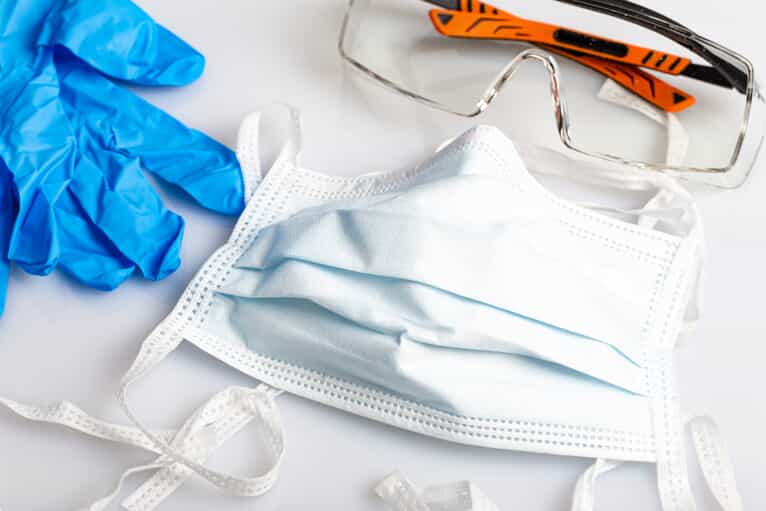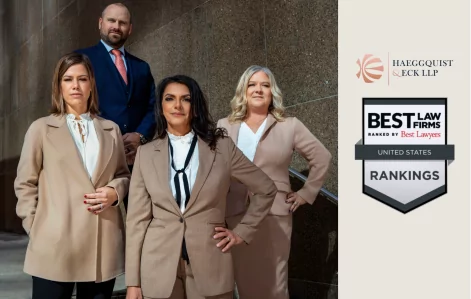If you’re wondering about what your employer should provide to protect you at work during the COVID-19 pandemic, here’s the short answer:
Employers, even independent of COVID-19, are required to keep their employees safe. Required safety protections, however, vary depending on your specific employment situation.
First, determine if you are an “essential” worker. Please see our other post on this topic. Next, determine what protection your employer must provide. The answer to that question varies and is based on a number of factors such as the nature of your employer and your job, to name just a few, but with COVID-19, almost all employers need to provide employees with some form of personal protective equipment (“PPE”) and so-called “safe work practices.”
Now, here’s a more detailed answer:
What Additional PPE and Safe Work Practices Are Available to Essential Workers Due to COVID-19?
To help provide a framework of resources you may wish to consider for PPE protections, we outline below a few of the key laws and regulations where PPE protections may be found, and also provide information on some of the more recent COVID-19 specific guidance that has been provided (in some cases, mandated) by governmental and regulatory authorities.
As a starting point, at the federal level, although the Occupational Safety and Health Administration (“OSHA”) admits the OSHA Act of 1970 (“OSHA Act”) does not specifically address COVID-19, it points to pre-existing provisions containing PPE requirements to offer protections to some workers. To help provide further information, OSHA issued a document entitled, “Guidance on Preparing Workplaces for COVID-19” (the “OSHA Guidance”).
In addition to covering certain PPE protections, the OSHA Guidance covers a variety of measures to help protect workers, including infectious disease preparedness and response plans. Currently, a bill has been introduced (H.R. 6139, proposing the “COVID–19 Health Care Worker Protection Act of 2020”) seeking to mandate an emergency temporary OSHA standard to add additional PPE protections for healthcare workers in view of the extreme dangers presented by COVID-19. We are hopeful that more legislation, at both the federal and state level, is introduced to help protect workers in all fields, and not just for health purposes, but for financial reasons as well. A helpful website to track legislation is linked here. We have also issued separate posts about various new legislation here.
Similarly, at the state level, California’s pre-existing Aerosol Transmissible Disease (“ATD”) Standard provides protections useful for dealing with COVID-19. The ATD Standard is designed to prevent worker illness from infectious diseases that can be transmitted by inhaling air that contains viruses, bacteria, or other disease organisms.
To assist you with understanding how the ATD provides COVID-19 protection, California’s Department of Industrial Relations, Division of Occupational Safety and Health (“Cal/OSHA”), published online guidance concerning the ATD Standard and COVID-19 (the “Cal/OSHA Guidance”). As you will see in the Cal/OSHA Guidance, only a limited list of employers are subject to the ATD Standard, such as certain healthcare related entities, laboratories, correctional facilities, homeless shelters, drug treatment programs, and other locations that Cal/OSHA notifies in writing that they must comply with the ATD Standard.
The Cal/OSHA Guidance also outlines requirements employers must follow when an illness such as COVID-19 presents a “significant risk” of exposure in the workplace. These requirements include the implementation of an Injury and Illness Prevention Program designed to prevent or reduce infection hazards, and training employees on COVID-19 infection prevention methods. Other protections, of course, apply to all employers, such as providing washing facilities. Notably, the Cal/OSHA Guidance outlines requirements whereby an employer must assess if hazards from COVID-19 are present in the workplace that necessitate providing PPE. If such a hazard is identified, the employer is to provide properly fitting PPE.
In addition, to the extent an employer is not required to comply with the ATD Standard, Cal/OSHA recommends that the employer follow current guidelines of the Centers for Disease Control and Prevention (the “CDC”) for COVID-19. Although the CDC is not currently requiring masks for all essential workers at all times, it continues to release guidance periodically to address this unfolding pandemic. For example, on April 8, 2020, the CDC issued updated guidelines for essential workers (the “CDC Guidance”). The CDC Guidance is principally designed to keep essential workers on the job.
Per the CDC Guidance, essential workers who have been exposed to COVID-19 may go back to work if they are asymptomatic and adhere to certain requirements, such as taking their temperature before going to work, wearing a face mask at all times for at least 14 days after they were exposed to COVID-19, and practicing social distancing at work as much as possible. (Workers may or may not find that to be an improvement from staying home for a 14-day period after exposure).
Perhaps some of the most striking recent changes have come, for many essential workers (such as those in the grocery and food service industries), at the local government level. Recently, the County of San Diego ordered (“April 9 CSD Order”) that workers in contact with the public in restaurants or other essential business that serve food, such as grocery stores, pharmacies, convenience stores, gas stations, banks, or public transportation, wear a face covering.
On the issues of safe work practices, we have all seen social distancing and sanitation measures addressed at every level: federal, state, and local. Often, it is at the state and local level where the most stringent guidance is provided. For example, in the County of San Diego, “essential” businesses are now required to publish a COVID-19 plan (a “Social Distancing and Sanitation Protocol”) and undertake mandatory sanitation practices. Essential businesses in San Diego County must provide hand sanitizer and other disinfecting products, set schedules for sanitization efforts, ensure measures to distance workers from one another and from the public, and a host of other requirements. Requirements for sanitation and social distancing are also covered in the April 9 CSD Order.
We encourage employees to monitor all current guidance offered by federal, state and local regulatory authorities concerning workplace safety at all times, but especially during COVID-19.
Finally, you should also be aware that OSHA, for example, requires employers, under certain facts, to report cases of COVID-19 in their employees as a workplace injury. Knowing that you are working in an environment with existing COVID-19 cases is a key part of being able to adequately protect yourself.
What Happens If My Employer Tries to Prevent Me From Reporting PPE Violations Or Fires Me Because I Complain About A Lack of PPE?
Depending on your employment situation, various legal remedies exist if your employer prevents you from reporting a lack of PPE or takes any adverse employment action against you because you complain or request protection. For example, several states have so-called “whistleblower” laws to protect employees. In addition, if you face any adverse employment action for demanding PPE or other protections, you may have claims for retaliation, wrongful termination, and other employer misconduct. Reports are surfacing of employees at Amazon and other grocery/delivery businesses, as well as staff at hospitals and medical facilities (doctors, nurses, and other health professionals) facing a host of adverse employment actions for striking (see post), protesting, complaining, or refusing to work without adequate PPE.
What Happens If I Become Ill or Die Because My Employer Failed to Protect Me?
The media is beginning to report on the unfortunate COVID-19 related deaths (or severe physical injuries) of many essential workers. If you pass away due to the illness, a wrongful death claim may exist depending on the circumstances. In the event of serious bodily harm or injury, there are a host of claims that may be available to you. Feel free to contact us if you have questions.
To schedule your free initial consultation, contact us online or call (619) 342-8000 today!





